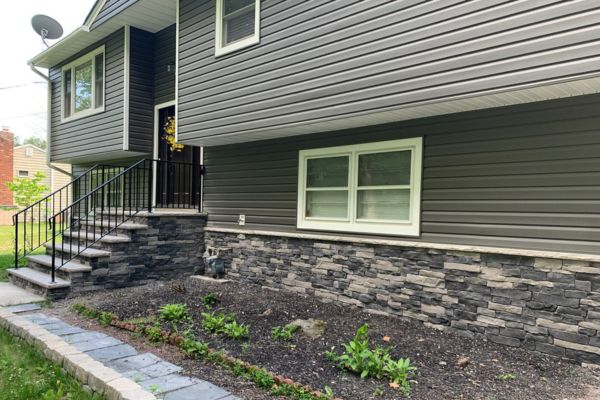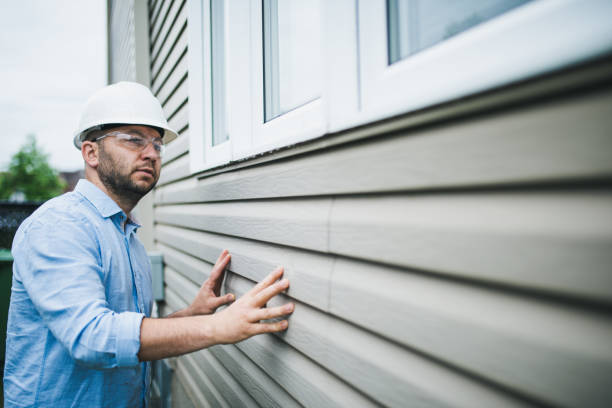Your Go-To Morris Siding Contractor for All Residential Siding Needs
Your Go-To Morris Siding Contractor for All Residential Siding Needs
Blog Article
The Essential Overview to the Various Sorts Of Home Siding and Their Unique Benefits
In the realm of home improvement, choosing the appropriate home siding is a vital decision that influences both visual appeal and functional performance. With so numerous choices to think about, which home siding product genuinely stands out for your details task?
Timber House Siding
Timber siding, a popular choice for property exteriors, uses an ageless visual that incorporates all-natural appeal with architectural honesty. This house siding product is readily available in various styles, including clapboard, shingles, and board-and-batten, allowing house owners to customize their façade to match their layout choices. Timber siding is usually crafted from long lasting varieties such as cedar, redwood, or yearn, which are known for their strength and ability to hold up against ecological stress factors.
Among the key advantages of wood siding is its superb insulation residential or commercial properties, which can add to energy performance and lower home heating costs. Furthermore, wood home siding is biodegradable, making it an ecologically pleasant choice when sourced sustainably. Routine maintenance, including paint or discoloration, can prolong its life-span and enhance its appearance, permitting property owners to maintain the natural appeal of the wood.
Nonetheless, prospective downsides include susceptibility to bugs, rot, and weather damage, necessitating adequate therapy and maintenance - morris siding contractor. Regardless of these worries, when effectively cared for, timber home siding can offer a long lasting and gorgeous solution that boosts the personality of a home while providing a cozy, inviting environment

Vinyl Siding
Plastic house siding has emerged as a leading option for property owners seeking a low-maintenance exterior option that incorporates sturdiness and cost. This flexible product is crafted from polyvinyl chloride (PVC), making it immune to different weather, including dampness and UV rays. Therefore, vinyl siding does not warp, rot, or discolor, guaranteeing long-lasting visual charm.
One of the key advantages of vinyl siding is its considerable series of styles and shades, enabling house owners to accomplish the wanted try to find their home without the need for constant repainting. Furthermore, vinyl siding is simple to install, which can significantly minimize labor prices during building and construction or improvement projects.
Plastic exterior siding additionally adds to energy performance. Several options feature insulation backing, which improves thermal performance, assisting to preserve comfy indoor temperature levels and possibly decreasing power costs. Additionally, its smooth surface assists in simple cleaning, needing only regular washing with a garden tube to get rid of dirt and debris.
Fiber Cement Exterior Siding
Fiber concrete siding has obtained grip amongst house owners and contractors alike as a result of its impressive mix of resilience and aesthetic flexibility. Composed of a mixture of cellulose, sand, and concrete fibers, this exterior siding choice is engineered to endure severe climate condition, including high winds, hefty rainfall, and temperature level fluctuations, making it a lasting choice for household outsides.

One of the key benefits of fiber concrete house siding is its resistance to pests, such as termites, and its non-combustible nature, offering boosted fire security. morris siding contractor. Furthermore, it is available in a wide selection of styles, shades, and textures, allowing house owners to achieve their desired visual without compromising performance
An additional benefit is its reduced maintenance requirements; fiber cement home siding generally needs paint or discoloration every 5-10 years, which is much less constant than other materials. Additionally, its long life adds to a reduced total price of possession, as it reduces the need for regular repair services or substitutes.
Ultimately, fiber cement house siding represents an outstanding investment for those seeking a durable, appealing, and functional exterior option, integrating both kind and feature to improve the home's aesthetic appeal.
Metal Siding
The allure of metal exterior siding read this lies in its robust longevity and contemporary visual appeal, making it a preferred choice for contemporary design. Offered in products such as aluminum and steel, steel siding offers a series of shades and finishes, enabling home owners to accomplish a tailored appearance that complements their design vision.

Power efficiency is one more substantial advantage, as numerous steel siding products are made with insulation choices that aid manage interior temperatures. This can bring about lowered power costs gradually. Additionally, steel siding is often recyclable, making it an ecologically pleasant choice for sustainability-minded homeowners.
The installment procedure for metal home siding can be fairly simple, leading to a quicker turnaround time for building projects. On the whole, steel exterior visit this web-site siding combines capability and design, making it a useful option for those looking for a long-lasting and visually enticing exterior finish.
Block and Rock Home Siding
Brick and stone siding stands out as a timeless choice that enhances the aesthetic charm of any home. Recognized for their sturdiness and low upkeep, these products supply a remarkable return on investment while elevating the residential property's visual appeal. Available in various colors, textures, and patterns, block and stone can be tailored to match varied architectural designs, from standard to modern.
One of the primary benefits of block and rock home siding is their energy effectiveness. Both materials possess all-natural shielding properties that assist regulate interior temperatures, possibly reducing heating & cooling expenses. In addition, they provide premium fire resistance compared to other home siding alternatives, contributing this link to improved security.
An additional benefit is their durability. Brick and rock can last for years, frequently needing marginal maintenance past periodic cleaning. Unlike wood home siding, they are unsusceptible bugs and rot, making certain a lasting exterior that stands up to the components.
Verdict
In summary, the selection of siding considerably affects a home's aesthetic allure, power performance, and upkeep requirements. Each sort of home siding-- whether wood, plastic, fiber concrete, block, or metal and rock-- supplies one-of-a-kind advantages tailored to various homeowner choices and ecological conditions. Understanding these alternatives makes it possible for notified decisions that boost both the longevity and aesthetic charm of residential outsides. Eventually, choosing the appropriate home siding is necessary for accomplishing an equilibrium in between functionality and layout in domestic architecture.
One of the primary advantages of timber home siding is its excellent insulation residential properties, which can contribute to power effectiveness and reduced heating prices. Additionally, timber siding is naturally degradable, making it an eco friendly choice when sourced sustainably.One of the key benefits of steel siding is its resistance to different ecological factors.Energy effectiveness is an additional significant advantage, as lots of metal exterior siding items are made with insulation alternatives that help control interior temperature levels. Each type of exterior siding-- whether wood, vinyl, fiber brick, metal, or cement and stone-- uses unique benefits customized to various property owner choices and environmental conditions.
Report this page